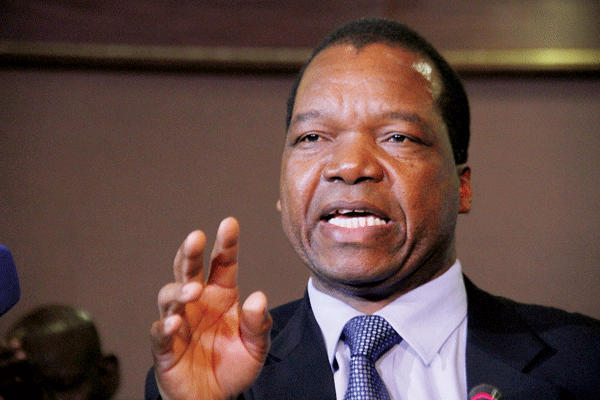
BY VENERANDA LANGA
Reserve Bank of Zimbabwe governor John Mangudya yesterday refused to publicly disclose the identity of the 200 depositors who own the bulk of the $34,5 billion bank deposits in the country.
Mangudya told the Parliamentary Budget and Finance Portfolio Committee chaired by Felix Mhona that he was prepared to disclose the depositor’s profiles in camera to Parliament without the presence of the media, saying it was confidential information.
He had appeared before the committee to give oral evidence on the Monetary Policy Statement (MPS) and cash shortages.
“The money supply in the economy is such that it is $39,5 billion and of that, $12 billion is foreign currency and $22 billion is local currency,” Mangudya said.
“The $39,5 billion also reflects deposits held by the banks of $34,5 billion, of which 50% of that is owned by around 200 entities and their deposits range from $2 million to $2 billion,” he said.
Hwange East MP Wesley Sansole (MDC Alliance) then asked Mangudya to disclose the names of the 200 entities or the individuals.
However, Mangudya told the committee that any of the 200 depositors could cause the whole market to sweat and that this showed skewed distribution of wealth.
- Chamisa under fire over US$120K donation
- Mavhunga puts DeMbare into Chibuku quarterfinals
- Pension funds bet on Cabora Bassa oilfields
- Councils defy govt fire tender directive
Keep Reading
“We need tools to redeploy that money which is acceptable to the owners of the money and to ensure that the money supply does not cause headaches to the economy. The way any one of these depositors behaves can cause the whole market to sweat,” he said.
Mangudya told the committee that de-dollarisation was just the starting phase as it was a long process.
Asked if he could consider paying civil servants salaries in cash as transactions through mobile platforms severely diminished their bank balances, Mangudya said he would need to get insight on the figures involved from the Public Service Commission first before making a decision.
On mobile money transfers charging premiums for cash, Mangudya said the central bank was not their regulator.
He said he would continue feeding cash into the market in dribs and drabs in order to rein in inflation.
Bulawayo Central MP Nicola Watson (MDC Alliance) asked Mangudya to explain why he continuously announced policies which were not working.
“If you think that our policies are failing, what it means is that players like business are the ones that are failing. We are importing electricity and fuel and it means that we need to ensure that we come up with strategies to turn around this economy so that at the end of the day, we produce for ourselves and export the balance. It is failure of the business community and the individuals to take care of these policies,” the lender of last resort boss said.
“As MPs, help us on devolution and say how many farmers are producing in my constituency. We need to be productive and these are non-monetary matters. As the central bank, we are trying our best. We do not partake our own policies — policies are for the people to use.”
Mangudya said the policy where certain fuel stations were now allowed to sell in forex would go a long way in harnessing money into the inter-bank market.
“We will ensure these designated fuel stations are well monitored and that there is no arbitrage. We do not believe there will be abuse,” he said.
He told the committee that last year, the country failed to achieve its growth rate because of drought, where water levels at Kariba Dam were low and electricity supplies were reduced, thereby affecting production.
“2019 was a difficult year. In 2020, we are going to put money in doses to grow the economy,” he said.
The RBZ governor said he was going to control money supply so it does not cause inflation.
“We expect month-on-month inflation to be 0% to 5% and 40% to 50% on a year-to-year basis.”











